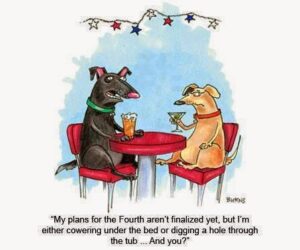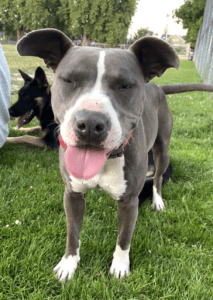Does Your Pet Get Anxious During Fireworks?
It’s that time of year again! The time for barbecues, watermelon, and long summer nights that end with a bang. Of course, I’m talking about July 4th and the fireworks that come with it. While we humans may love watching the sky light up with colors and noise, our furry friends may find it absolutely terrifying. 
The loud noises and bright lights can cause great distress, discomfort, and anxiety. In extreme cases, pets may even run away in search of safety. Research shows that approximately 40-50% of dogs have a noise phobia, which can cause vomiting, diarrhea, trembling, and excessive hiding. According to a study published in the Journal of Veterinary Behavior in 2013, cats can also become anxious due to loud noises like fireworks. However, most of the information available is coming from research with the canine variety.
So, what can you do to help keep your cats and dogs calm during the fireworks expected on July 4th? Let’s explore some options.
Keep your pets indoors
Keeping pets inside is the first and vital step to keep them calm during fireworks. Make sure to put your pets in a safe and secure room where they feel comfortable. If possible, play relaxing music, or turn on the TV or radio to distract them from the noises and to mask the sounds of fireworks. Close windows and doors to reduce the noise level and use curtains and blinds to block out the flashes of light. For some, a crate can provide a sense of safety and security. You can place their favorite toys or blankets inside the crate to help them feel comfortable. Make a comfortable bed in a quiet corner of the room where your pet feels safe. If your pet has a specific hiding place, let them go there as they feel comfortable.
Plan ahead and exercise …get them tired
Before the fireworks start, it’s a good idea to exercise your pets. A tired pet is less likely to become distressed or anxious.
So, take your dog for a long walk or play with your cat to burn off their energy. It would be best to schedule your walks or play sessions at a time of day with less chance of fireworks so that your pets are calm when they return home. This can be difficult if there are neighborhood fireworks going off throughout the day. If this is your case, then play inside as much as you can. Remember that mental stimulation is very tiring as well. So, even doing some training sessions will help tire your pup out.
This is Gracie & Dancer after a game of “fetch”.
Stay Relaxed & Don’t Panic
This may sound totally crazy, but how you behave and respond is very important. Your dog or cat will pick up on any anxiety you have either in anticipation or during the fireworks. Try to stay calm yourself without engaging in a lot of anxious preparation before hand. During the fireworks simply enjoy or ignore them, but try not to get tense. It is so easy for us to be frustrated that they either start so early or continue so late…let it be. Take care of you and have some time calming tea, a drink if that works for you, whatever it is…if you get anxious so will your pet. Trust me on this..I work on not putting my anxiety onto my dogs every day! It is not easy, but I fully believe it is very important to keep working on.
Use Calming Aids
Several calming aids are available and can be very helpful. This really depends on your dog or cat and what will work best for them. Here are a few things that I use in my practice:
Fireworks Are Not Just Affecting Our Pets!
Fireworks also have a detrimental effect on the environment and local animals. I know..BAH HUM BUG! Traditional Fireworks contain charcoal and sulphur fuel, a perchlorate oxidizer to help with burning, plus binders, colourants and propellants (see image). When ignited, the pyrotechnics are spectacular, but they emit large amounts of smoke, unused perchlorates and metal by-products from the colourants, all of which are contaminates. These toxins can travel for miles and settle on bodies of water, soil, or plants, anywhere.
 The smoke and debris can also harm animals, including birds, squirrels, rabbits, and deer. Birds that fly near fireworks can get disoriented, and the loud noises can cause them to panic and fly into walls or windows. The firework debris can also accumulate on the ground and in water, which local wildlife can ingest, resulting in toxicity.
The smoke and debris can also harm animals, including birds, squirrels, rabbits, and deer. Birds that fly near fireworks can get disoriented, and the loud noises can cause them to panic and fly into walls or windows. The firework debris can also accumulate on the ground and in water, which local wildlife can ingest, resulting in toxicity.
So, what can we do to minimize the impact of fireworks on the rest of us and the environment?
Attend Public Displays
Instead of setting off your own fireworks, consider attending a public fireworks display since they are going to happen anyway. These displays are usually held in open areas, away from residential neighborhoods and wildlife habitats. Plus, they’re often designed so that the fireworks are launched over bodies of water, which can help reduce the impact on at least the “non aquatic” environment.
Purchase Eco Friendly Fireworks
If you do decide to set off your own fireworks, consider using eco-friendly options. There are many brands of fireworks that produce less smoke and debris and contain fewer harmful chemicals. In addition, some fireworks are designed to break down into harmless substances when they come in contact with water.
Clean Up
After the fireworks have finished, be sure to clean up any debris and dispose of it properly. This can help prevent the toxins and pollutants from entering bodies of water and harming wildlife.
I wish you and your pets the best 4th of July! Be safe & well.



I doubt the fireworks noise will affect Rose very much. All the construction of the last few months has gotten her used to strange sounds.
I know the last few months have been noisy and rough for Rose. Interestingly enough, there is therapy for noise aversion that subjects the cat or dog to loud noises over a period of time. So, it seems you got therapy along with the construction 🙂